Archives 2022
Self-Identity and Artist’s Existence
Ágnes Pálfi: Thinking back on the professional programmes as well as the entire festival, it is worth asking ourselves the question: were we, editors of Szcenárium, right in selecting the concepts of “Identity – Sacrality – Theatrality” to delineate the topic of the two professional days organised by the journal?
Zsolt Szász: There is no point denying that the artistic workshop of the theatre showed some resistance to our topic selection at first, which stemmed from the apparent political projection in our proposition. Since well do we remember the roundtable organised by Heinrich Böll Foundation in Berlin last December, where Attila Vidnyánszky was told off for arbitrarily associating nationalism with Christianity – as if serving the current Hungarian political regime – in the production titled Johanna a máglyán (Joan of Arc at the Stake). Watching the video recording of the debate, one cannot help thinking that the person who posed the questions was equally unfamiliar with the Claudel–Honegger piece and its historical background, namely that the virgin of Orleans is a key figure of both French national identity and European Christianity, whose flag the allied Euro-Atlantic states fought under against Hitler’s Germany during the Second World War. Beyond ideological narrow-mindedness, the debate in Berlin betrayed signs of cultural amnesia which we could not possibly ignore while preparing for this festival.
Ágnes Pálfi: During both days, we could feel the interest in the “philosophy” of the festival among the audience taking part in our professional programmes. Esther Slevogt, editor of the webmagazine Nachtkritik, even adressed the question to us if we had any written resolution on the topics we had offered for discussion. And at the end of our programme she said she missed a discourse where we could have clarified our stance on the above three concepts.[1]
Zsolt Szász: Indeed, such a summary was impossible on the scene, unfortunately, due to lack of time. But from what did come to pass, our answer might have become clear to Barba’s statements presented in the two mottos. First, that for a true theatre practitioner professional identity takes priority because this is the “only profile on which we can consciously act as rational beings”. Second, that “There is no genius loci, genie of the place, either in theatre or culture.”
Ágnes Pálfi: Let us not forget though that Barba’s book titled The Paper Canoe, where these two quotations[2] are taken from, was published twenty years ago and the world has changed a lot since then. I think it would be difficult to argue with Barba’s statement concerning professional identity. However, his second idea arises in an entirely new context nowadays. Perhaps this was most clearly explained by the director of Caragiale’s Two Lottery Tickets, Alexandru Dabija, during the professional roundtable when he spoke about the historical resentment and inferiority complex of small Central European nations liberated from Soviet influence, which resulted in the efforts of these countries to create a culture not by focussing on themselves but adapting to global trends instead. Through his very choice of play and elemental passion in staging this self-critical absurd comedy, the director apparently flies in the face of that tendency. Just like the other two participants in the professional event organised by Edit Kulcsár, Matei Vişniec and Helmut Stürmer both agreed that the emblematic composer of Romanian national self-image was still the great end-of-the-19th-century national author, I. L. Caragiale.
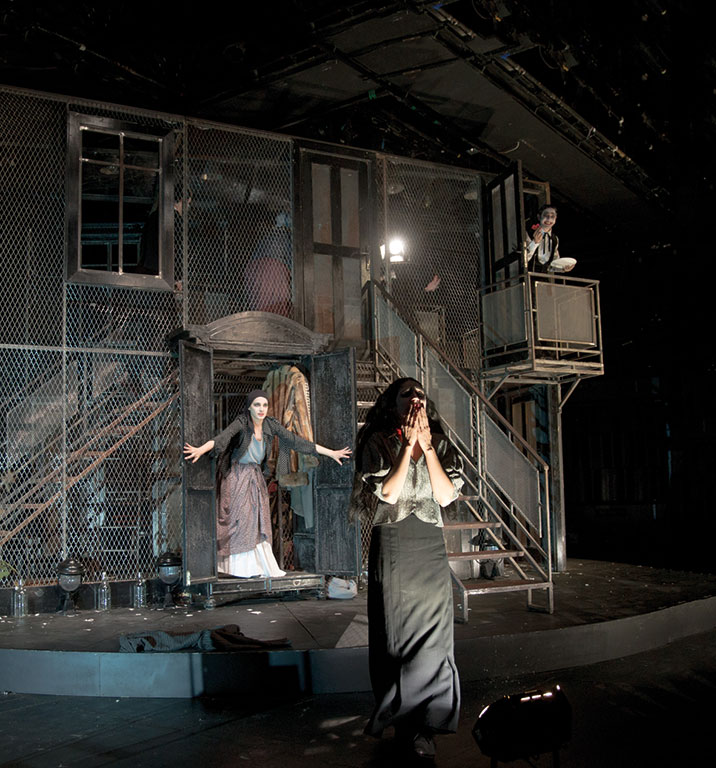
Zsolt Szász: A Summer Day, directed by Farid Bikchantaev and performed by the otherwise most likeable team of the Tatar State Academic Theatre from Kazan, was a shining example to me of an inner drive to adapt.
The Tatar stage adaptation of the play by the Scandinavian author, Jon Fosse warns of the dark side of transculturalism. It reminds me of the ’70s fake-existentialist Hungarian films, which came from a compulsion to conform to the Western taste of life.
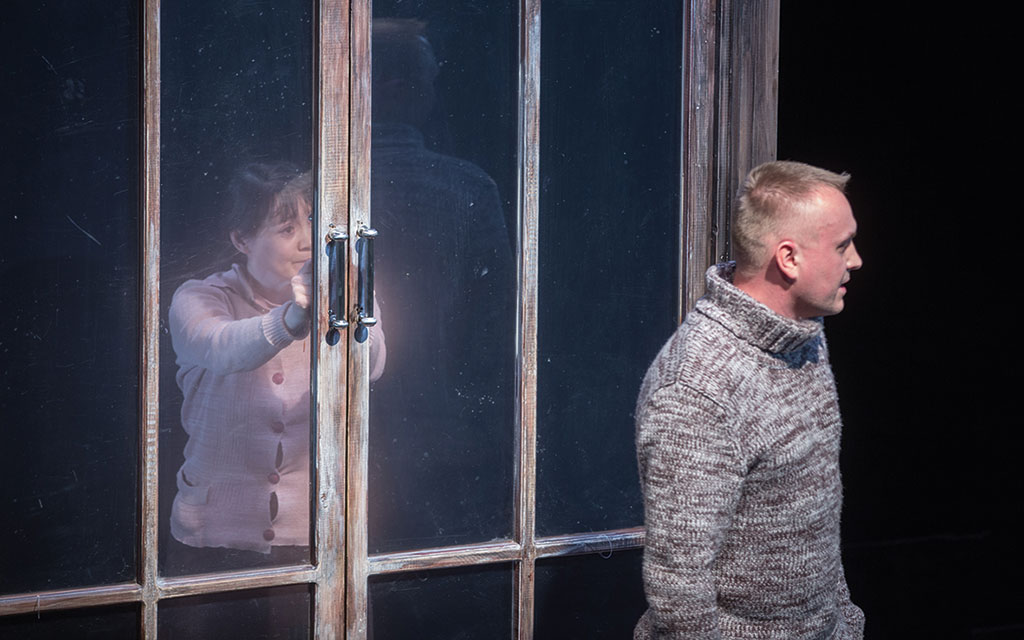
Ágnes Pálfi: The Georgian postdramatic Macbeth caused a sense of lack for a similar reason. Although the genre of tragedy itself was enough to make this production more theatrical than that of the Kazan artists’, it failed to live up to the expectations expressed in the programme guide by a drama student in Igor Jacko’s masterclass: “…[I’m curious about the Georgians because] I’m interested in how much Georgian folk tradition I can see in their production”. One may really think that in a several-thousand-year-old culture like the Georgian, the most archaic layer of Shakespeare’s piece will emerge, allowing a new kind of interpretation. Instead, this production was dominated by the sort of Western European aesthetics which deliberately downplays dramatic collision.
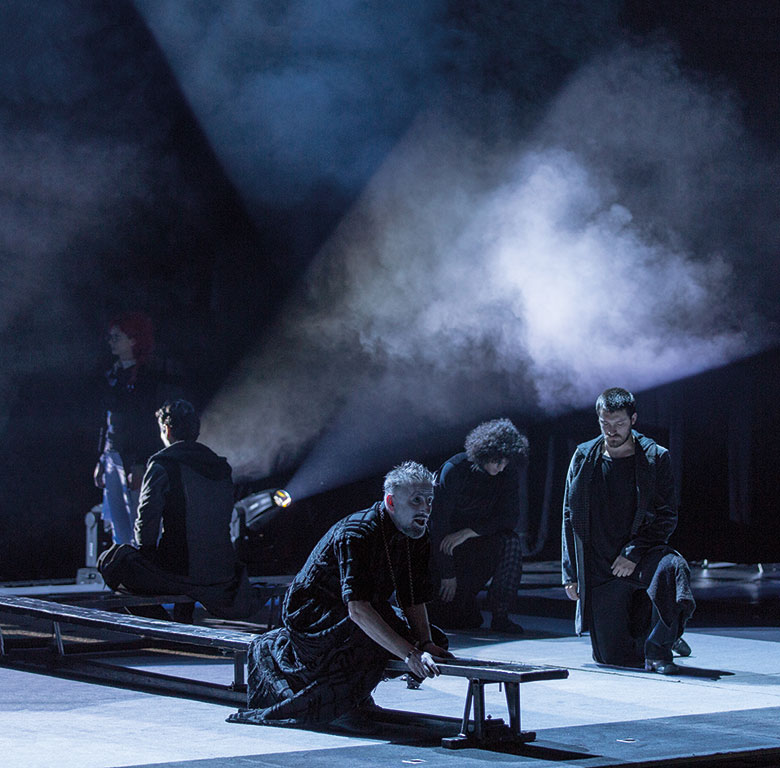
Zsolt Szász: By ethnic culture we naturally do not only mean “folk tradition” in the narrow sense – as the drama student put it –, but the totality of the features of mentality which appeared in a complex manner on the Turks’ stage in the production titled Where to?, for example. Thanks to the hyperrealist acting style, we could directly see the layers of contemporary Turkish society, how the Islamic ethical system permeates human relationships, what serious conflicts are generated by the unwritten law handed down from the Middle Ages (see the shepherd’s story about his raped sister) and how controversial their relationship is to European civilization which they crave.
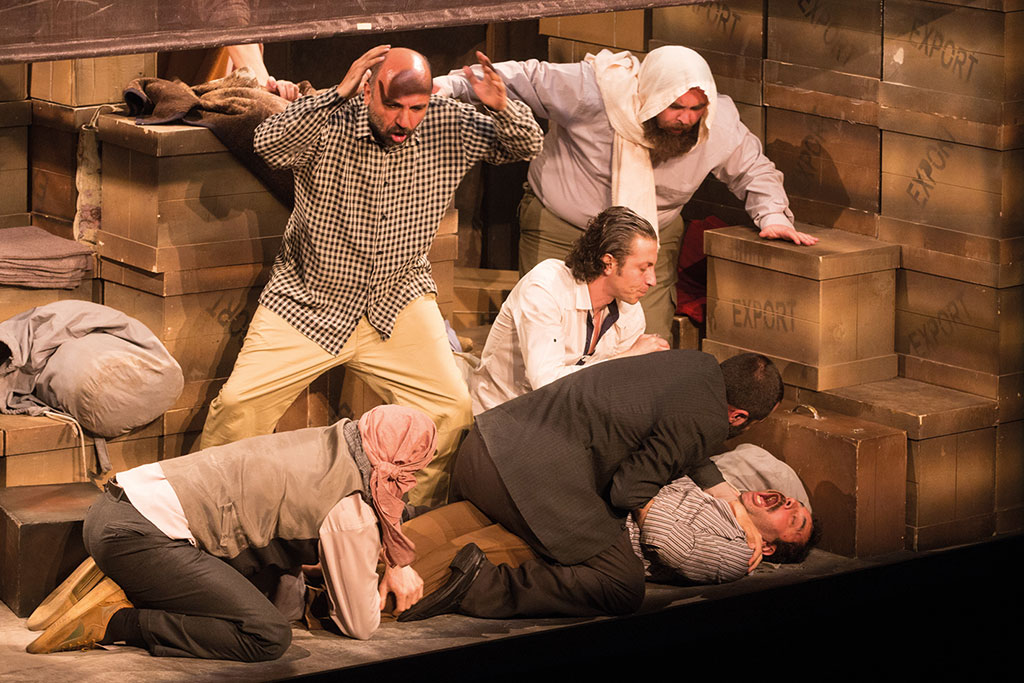
Ágnes Pálfi: It is a shame we did not see the Iraqi production titled Camp, because – on the basis of the photos and stories – we suppose that this production also informs of a critical and transitory existential situation and the sense of identity in jeopardy. As a result of the two world wars, this kind of continuous identity crisis in the Western part of Europe now has a century-long history. These problematics were represented at the festival by a mono-drama, First Love, based on a Beckett short story. Staged by Péter Gemza, the piece showed, through the transmission of personality disorder, the process of the loss of self-identity and its consequences, the psychotic state which already produces symptoms of an incapability of living. At the same time, this performance proved that Hungarian theatre is now eminently able to speak the language of absurd drama, which emerged after the Second World War.
Zsolt Szász: Productions Russian also in their topic – including the Lithuanian Rimas Tuminas’s The Masquerade, and The Seagull by the Serbian National Theatre, Novi Sad, Serbia – approach identity–sacrality–theatrality far more indirectly, even though almost all of them pose the question directly, too: “After all, what are we, Russians like?”. To this, the substantive answer lies in the very active and creative relation of the companies to the Russian classical authors they have already put on stage. It was particularly pronounced in Viktor Ryzhakov’s direction of Gogolrevizor, which he carried out with graduate MHAT studio students. Following the best Russian avant-garde traditions, Gogol’s original scenario was replaced by a rendering of the taste of life which the new generation, born in the years of the regime change, had as well as the emotional and intellectual exposure of the artist’s existence.
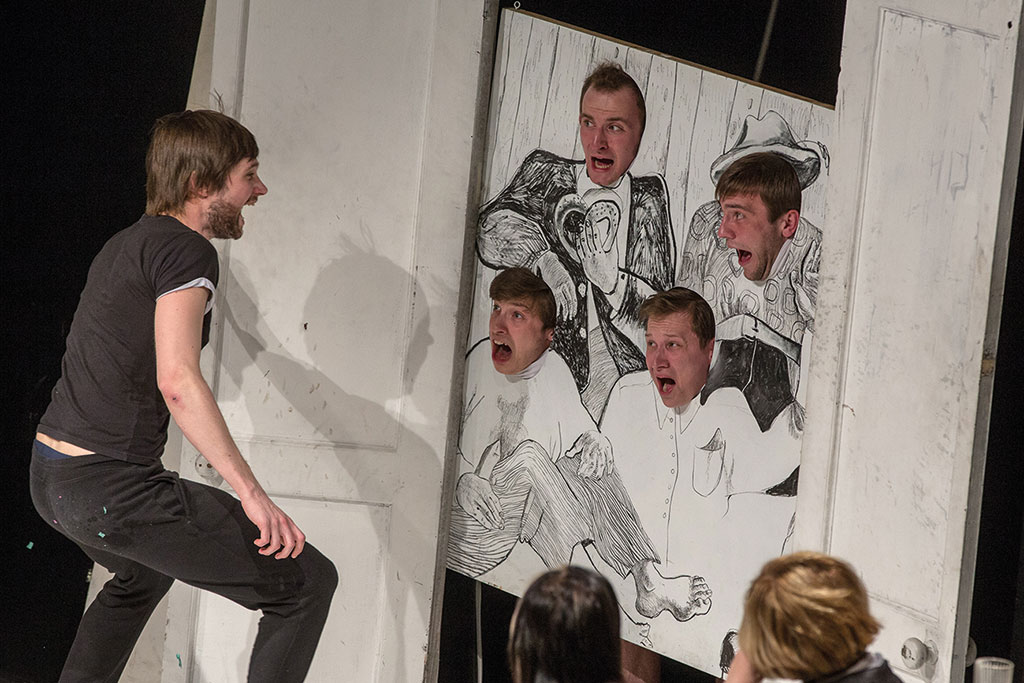
Through the string of scenes developed from school études, which gives young actors the freedom to play and become someone (or anyone?), the announced arrival of the revizor is beginning to come across as a waiting for some absurd judgment-situation. As a result of that, the production is filling up with a moral content to provoke discourse about the role of art and its social benefit.
Ágnes Pálfi: A similarly brave attempt on Ryzhakov’s part has been the re-evaluation of the Great Patriotic War, previously treated as a “sacred cow”, in The Damned and the Killed. This staging depicts the captivity of young conscripted soldiers of the Soviet Army as similar to German concentration camps. Yet this historical pivot point of Russian identity is not destroyed, but built on other foundations and sanctified through the representation of the senseless sacrifice of Russian Holocaust victims. Watching the production, one, as a Hungarian, suddenly comes to realise what obligations our dramatic literature and theatre art has fallen short of in terms of processing the two World Wars – no matter how significant a proposition Pilinszky’s KZ-Oratórium (KZ Oratorio) is, which reflects not on Hungarians’ historical trauma but directly on European identity, or the loss of it.[3]
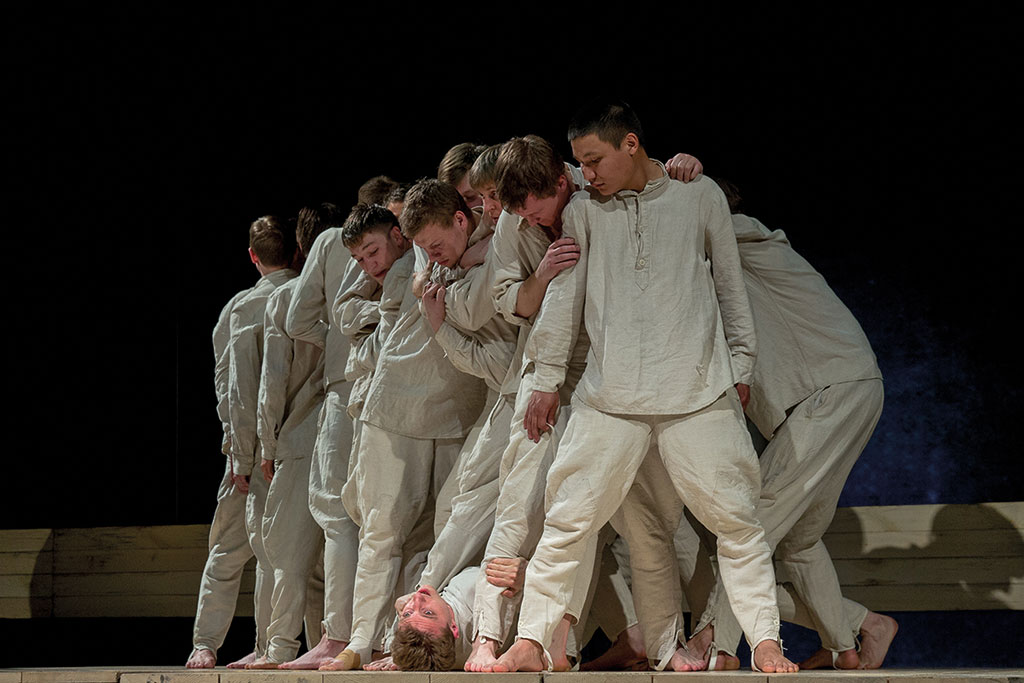
Zsolt Szász: As far as Russian mentality is concerned, the memory abides with me of how Vasiliev on the professional day devoted to his work associated adventurism, a Russian characteristic, with himself and with his stage directing activity as a European citizen of the world. This was also the central theme in Zero Liturgy, Fokin’s stage adaptation of Dostoevsky’s novel entitled The Gambler. It was the obvious intention of the director and all the creators of the production to absolutise and elavate to the level of world theatre this quality, deep-rooted in the soul of Russian people. This just became practicable in the currently cultivated forms of expression, with the use of the toolkit of post-dramatic theatre. Roulette on this stage is not merely a metaphor for the present state of the world; the revolving stage moving forward and backward within concentric circles is also the visualisation of the medieval wheel of furtune, of fate, which never punishes or rewards mortal man according to his works.

St.Petersburg, Russia (d: Valery Fokin, protagonists: Anton Shagin and Eva Ziganshina)
Ágnes Pálfi: When I was analysing the narrative structure of Dostoevsky’s The Gambler as a former Russist[4], I came to the conclusion that Alexey Ivanovich was the prisoner of the situation not only as a character, but also as a diarist, the narrator of the story with a burning ambition to become an author, who cannot break out of the vicious circle of hopelessness and the captivity of a future which terminated in the past. Naturally, it is not this inner drama of the protagonist which is put on stage here, because his struggle for language can only be represented through narrative prose (or maybe monodrama) in terms of genre. However, this stage adaptation can illustrate it most clearly that today, when money is not just a means to an end but the end in itself, we are all spinning on the same hamster wheel of life.
Zsolt Szász: Let me again refer to Vasiliev at this point, who thinks that this is the current megatrend which questions the legitimacy of art in the traditional sense no longer in the West only, but in the East as well. Vasiliev made a very sharp statement: the world does not need us, we ought to be shot down as terrorists. However, Alice, directed by Andrey Moguchy, has been proof to me that the situation is not that despondent, after all. The question of identity arises here as the ultimate proof of and haven for identity, like the rights and duties associated with the personal name. During the production in which Alisa Freindlich was meant to act for her benefit, the surplus arising from the sameness of names sets personal as well as collective memory into motion and restores – by the end of the play – the identity which connects the artist’s existence with that of a human being at an elemental level (even the spirit of place, genius loci is given a role when the war, the siege of Leningrad is evoked in the story). The manner of theatrality in which this rendering approaches the issue of identity and sacrality deserves special appreciation.
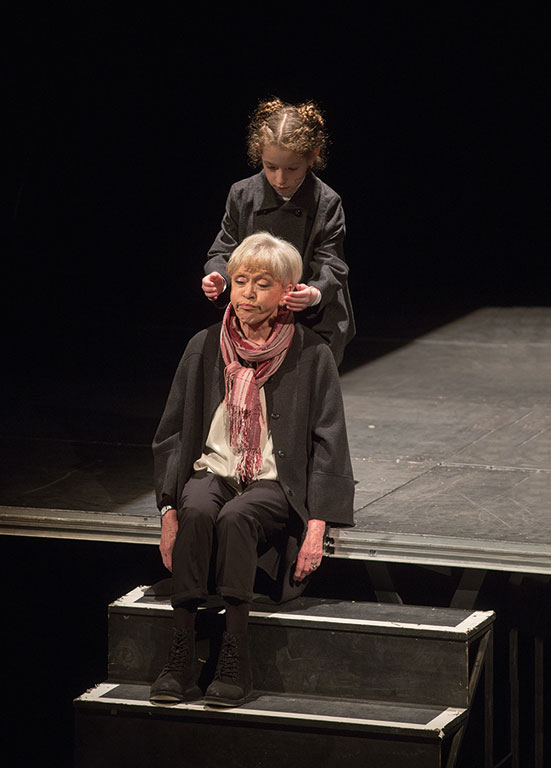
St. Petersburg, Russia (d: Andrey Moguchy, lead: Alisa Freindlich)

Ágnes Pálfi: In the case of Alexander Morfov’s Don Juan, however, we are dealing with a mythicised modern hero whom Erika Fischer examines in the History of European Drama and Theatre as the prototype of European man who has lost his identity. The interesting thing at the end of Molière’s comedy, which served as the basis for Morfov’s production, is, nevertheless, that the hero is identifying with the author’s satirical worldview more and more (see Don Juan’s last monologue in the “praise” of hypocrisy). That is, he is gaining a sort of discernment which can be interpreted almost as a kind of artistic identity already. Morfov omitted this monologue, but it was not his only change in Molière’s dramaturgy, since he used motives from other Don Juan pieces as well as intertexts. This inspired me to place Morfov’s rendering and the figure of Don Juan into the broader context of the mythical antecedent, taking some other literary transcripts of Molina’s original drama into consideration.
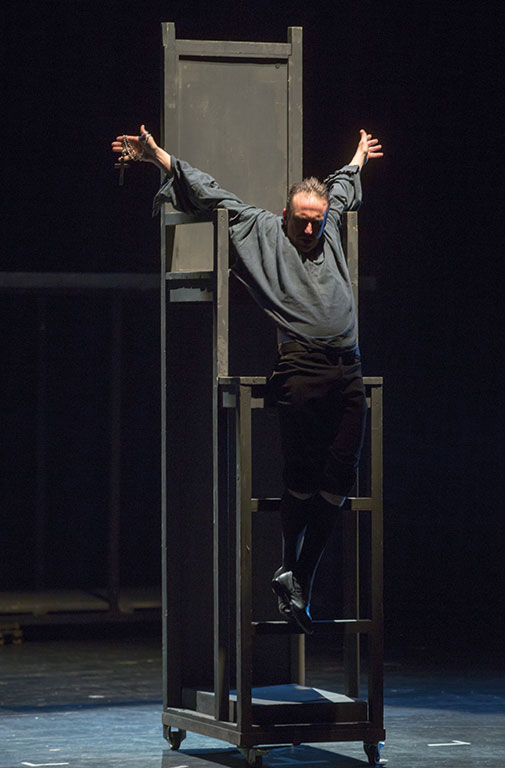
Sofia, Bulgaria (d: Alexander Morfov, lead: Deran Donkov)
Zsolt Szász: The idea of sacrality was represented at this festival, in a targeted manner, by Attila Vidnyánszky’s two stage directions: Mesés férfiak szárnyakkal (Fabulous Men with Wings) and Johanna a máglyán – Joan of Arc at the Stake. At the beginning of our conversation, we already mentioned what hostility the latter one had aroused in the West as well as among critics within the country. But nor was the former production rewarded according to its deserts at POSZT in 2011, saying: what have Hungarians got to do with this Soviet Gagarin theme? If we are talking about European identity, we cannot ignore the circa 1700 years, in the course of which, beginning with the reign of Emperor Constantine the Great, Europe became a culturally uniform cult community (regardless of the fact that this shared history has continually been interspersed with religious schisms and wars ever since). I have mentioned this because both performances are of a larger scale and other dimensions than the other productions at MITEM. It is enough here to refer to the apocalyptic view of time in Fabulous Men, or the simultaneous representation of the story of the fourth petty monarch, the myth of flight and the chronicle of the first space flight. The collision of the sacred and the profane in this production becomes historically concrete and relevant to us through the continuous conflicts of culture and civilization. For my part, I think that in order to reconsider the cataclysms of Hungarian history, our theatrical art as a whole would need a similar change of scale.


The photos published here of MITEM productions were taken by Zsolt Eöri Szabó.
Translated by Nóra Varga
(First publication in Hungarian: Szcenárium, April 2014, pp 14–22)
[1] See our professional programmes in Szcenárium, March 2014, pp 73–77
[2] Eugenio Barba: La Canoa di carta. Societa aditrice Il Mulino, Bologna, 1993. English translation from: http://asset.soup.io/asset/0826/4375_63b2.pdf p145, p147
[3] See the January and February 2014 issues of Szcenárium
[4] Pálfi, Ágnes: Puskin-elemzések (Vers és próza). Akadémiai Kiadó, Budapest, 1997, pp 71–88
(10 December 2022)











